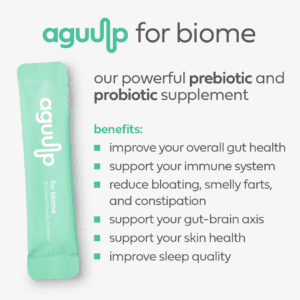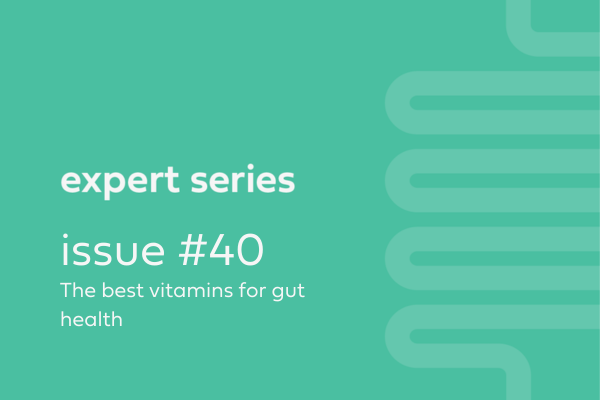7 ways to improve your Gut Health and Anxiety
How do probiotics influence gut health and anxiety?
There is increasing evidence to show that the gut microbiome plays an important role in mental health. This is because the brain and the gastrointestinal (GI) system are intimately connected. The collection of bacteria naturally residing in our gut, known as the gut microbiome, can influence our mental wellbeing and response to stress, according to research, and an imbalance of gut bacteria has been implicated in several neurological disorders including anxiety and depression.
Research shows that probiotics influence our mental health in many ways. Probiotics produce chemicals- known as neurochemicals, such as serotonin and gamma-aminobutyric acid (GABA), which modulate our mood, and they also influence the brain directly via a large nerve (known as the vagus nerve), which connects both the gut and the brain. Probiotics also activate neural pathways between these two systems and play a role in reducing inflammation.
What is the connection between gut health and its impact on anxiety levels?
The communication system that links the gut and the brain is known as the gut-brain axis. It is where signalling takes place between the gastro- intestinal system and the central nervous system, in which both systems are constantly sending messages back and forth to one another via the vagus nerve.
The two also communicate via neurotransmitters, which are chemical messengers secreted by neurons and can be transmitted within milliseconds. The 500 million neurons in the gut are in direct contact with the billions of neurons in your brain, forming the gut-brain axis, and we know that from research, the composition of the microbiota can have significant effect on behaviour and mood.
One of the most important neurotransmitters involved in the gut brain connection is serotonin, also known as the ‘happy hormone’. A significant amount (approx. 95%) of serotonin is produced in the gut, making it a key part of the gut-brain axis. Another neurotransmitter produced by your gut microbes is gamma-aminobutyric acid (GABA), which controls feelings of fear and anxiety. Studies show that increased GABA can lower anxiety and depression-related behaviours. As these two examples show, the gut-brain axis plays a key role in our mood and overall mental wellbeing, and research has shown that the gut-brain axis can have a significant effect on anxiety.
Are there specific strains of probiotics that have been found to be more beneficial for managing gut health and anxiety?
Research into the use of probiotics and how they affect our mood is still in its infancy. However, based upon the research that has been done so far, it is believed that there are specific strains of probiotic bacteria that have a particular benefit to mood and mental wellbeing.
These specific strains of bacteria are known as ‘psychobiotics’, which are thought to influence mood due to the impact they have on the body’s stress response system -a system that is known as the hypothalamic-pituitary-adrenal axis (HPA axis). An imbalance of gut bacteria (known as dysbiosis) has been shown to activate this stress response system, causing imbalances in stress hormones, which in turn can have a detrimental effect on anxiety levels, and sleep patterns, which further exacerbate anxiety and mood.
Psychobiotics are defined as ‘live organism that, when ingested in adequate amounts, produce a health benefit in patients suffering from psychiatric illness’, according to the ‘Society of Biological Psychiatry’. The specific strains of probiotic bacteria that have been uncovered so far, include strains from the following species of bacteria;
– Bifidobacterium longum (with 5bn found in our probiotic, aguulp for biome).
– Lactobacillus acidophilus Rosell-52 and Bifidobacterium longum Rosell
– Lactobacillus casei Shirota
Research is ongoing into other strains of probiotic bacteria that may have a therapeutic effect on mental health, and specific conditions such as anxiety and depression.
Are there dietary choices that can either help and/or hinder the effectiveness of probiotics in addressing gut health and anxiety?
Diet plays a significant role in the composition and diversity of our gut microbiome and can both hinder and help the efficacy of probiotics.Certain foods have been shown to encourage the growth of healthy beneficial bacteria in the gut whilst others can have the opposite effect and promote the growth of unhealthy and even harmful strains of bacteria. Tips to help maintain a healthy gut environment to maximise the effects of probiotics when it comes to addressing anxiety include;
- Reduce your sugar intake – this includes refined white sugars and carbohydrates, as sugar feed pathogenic bacteria and yeasts in the gut and cause dysbiosis. High sugar in the diet can also play havoc with blood sugar levels, further exacerbating anxiety and mood.
- Whole foods-‘Whole foods’ is a term given to foods that are in their natural state or those that have undergone the least amount of processing. Consuming foods that are in their whole food state aids in the digestive process as the digestive system doesn’t have to work as hard to process these foods. Processed foods can be more difficult for the digestive system to break down, encouraging bad bacteria to multiply. Whole foods contain less additives and sugar which can have a detrimental effect on the digestive system and on overall health. It is important to minimise processed foods in the diet and steer towards ‘whole foods’ which not only help encourage a healthy gut environment, but they also provide essential nutrients.
- Increase Fibre- Foods that are high in fibre are particularly beneficial for the health of our gut and the gut environment in general. Not only does fibre help provide bulk in the bowel and stimulates peristalsis (the natural movement of the bowels for the effective removal and elimination of waste products) but it also a very good source of vitamins and minerals, enzymes and in some cases, protein. Groups of foods that are high in fibre include; fresh and raw fruits and vegetables (preferably with the skin still intact), nuts and seeds, whole grains and legumes i.e. dried beans and peas such as soya beans, lentils, chickpeas, kidney beans, pinto and sprouted beans etc. Certain types of fibre also contain prebiotics, which act as a food source to the healthy bacteria in the gut, encouraging their growth. Examples of these include; leeks, onions, bananas, broccoli and kale. Prebiotics can also be taken in supplement form.
- Probiotic foods– dairy foods such as yoghurts are renowned for being a source of probiotic bacteria. However, processing can sometimes kill off the live bacteria in yogurts, leaving some commercial yogurts virtually void of all live beneficial bacteria. For this reason, ‘natural bio live’ yogurts are a better option as they will have been minimally processed to preserve as many of the live cultures as possible. Yogurts are also an excellent source of protein, calcium and vitamin D. Yogurt drinks are a very popular way of consuming live cultures. However, whilst many yogurts and yogurt drinks contain researched strains of bacteria, they often contain added sugar which feed the bad bacteria in the gut, resulting in reduced benefit of the good bacteria. Kefir is a fermented milk drink that contains several major strains of friendly bacteria as well as other beneficial nutrients such as amino acids (protein), vitamins and minerals and conjugated linoleic acid
- Fermented foods- Contain naturally occurring probiotic bacteria or have probiotics added to them. They are foods that are produced or preserved by the action of microorganisms. Fermented foods are also often high in amino acids, sodium, fibre and calcium. Examples of fermented foods include; kimchi, kombucha and sauerkraut.
- Natural sources of digestive enzymes- Pineapple, which is rich in a naturally occurring enzyme called bromelain and Papa fruit which is naturally rich in the enzyme known as papain, help to break down food molecules and assist in digestion.
- Avoid alcohol– alcohol directly influences disturbances in the composition of the gut microbiota leading to dysbiosis. Furthermore, alcohol causes blood sugar fluctuations which can exacerbate anxiety, mood, and energy levels.
- Caffeine- has gained a lot of negative attention over recent years, attributed mainly to its stimulant effects on the body. Caffeine increases stress hormones and in terms of the effects on the gut, this can lead to anxiety-induced gut symptoms in some people. However, the stimulant effects of caffeine have also been reported to have positive effects in certain individuals such as in the case of athletes and sports professionals. Furthermore, coffee for example has even been shown to have some health benefits in relation to the gut microbiome. It is thought that regular and decaffeinated roasted coffee can exert a prebiotic effect, attributed to its polyphenol content. In addition to this, research has shown those who consume coffee on a regular basis have been found to have higher levels of anti-inflammatory bacteria such as Faecalibacterium and Roseburia and lower levels of pathogens such as Erysipelatoclostridium compared to non-coffee drinkers. This is not to say high intakes of coffee is recommended due to the potential negative affects but it is certainly advisable to consume caffeine in moderation and according to individual tolerance and sensitivity.
In what ways can probiotics be integrated to managing anxiety, alongside other lifestyle factors? (mention aguulp for biome)
As we’ve learned, the area of research into the use of probiotics for supporting mental health is rapidly growing and is very promising, and clearly from the research that is being done, there is the potential for probiotics to have a therapeutic effect on conditions such as anxiety and depression.
As we’ve seen above, there are many ways that we can support our gut health through what we eat, which can have a positive impact on the gut- brain axis with the inclusion of probiotic and prebiotic foods and the avoidance of foods and substances that can lead to imbalances of the gut microbiome.
However, when we are looking to address a particular condition such as anxiety, supplemental form of probiotics are likely to offer optimal support and therapeutic benefit when combined with these dietary strategies.
Aguulp for Biome product has been extensively researched to contain strains have been scientifically proven to withstand the acidic environment of the gut, enabling them to reach the gut alive, which is an important aspect of probiotic therapy. This product has the benefit of containing both pre and probiotics, which when taken together in ‘synbiotic’ form, this repopulates the gut with good bacteria, while providing the bacteria with the nutrients they need to work properly.
It is a high strength product: providing 50 billion live bacteria-helping to target gut imbalances and restore and maintain healthy gut function, as well as being a multi-strain product containing 10 different strains of live bacteria (5 billion of each) which have been chosen for their specific role in helping to improve gut health & function. In addition this product contains highly researched strains including Lactobacilli and Bifidobacteria,
There are also several lifestyle factors that can be implemented alongside probiotic support to help reduce anxiety and these are as follows;
- Regular exercise– Important for both mental and emotional wellbeing, exercise can increase feel good endorphins as well as improving resistance to stress. Exercise has been shown to help improve energy levels, sleep and mood and reduce stress and anxiety. Furthermore, studies show that the microbiomes of physically active people are known to be more healthy and diverse.
- Avoid antibiotics where unnecessary– using antibiotics when you don’t necessarily need them can affect the diversity of gut bacteria, which could in turn affect the gut-brain axis.
- Get plenty of sleep– Getting adequate amounts of sleep helps us to feel revitalised, refreshed and reenergised, ready to take on the challenges of the day. Lack of sleep or interrupted sleep can have a profound effect on our day to day lives and can have a significant impact on our emotional wellbeing, stress levels and energy levels as well as our hormones and microbiome. The recommended amount is a minimum of 7 hours per night for an adult.
- Hydration- Drinking sufficient amounts of water keeps us well hydrated and helps counteract stress by encouraging the circulation of nutrients. The recommended amount for water intake is 2 litres per day (equivalent to approximately 8 small glasses). If you are not currently consuming this amount, it is important to build up to this amount gradually. Herbal and fruit teas count towards daily intake, but caffeinated drinks do not.
- Blood sugar management– fluctuations in blood sugar levels can exacerbate anxiety, including whole grains, essential fats and protein and eating regular meals and snacks can help keep blood sugar levels stable and have a positive effect on mood.
- Stress Management– Whilst it may not always be possible to completely avoid stress particularly as stress can come in many forms; whether it be physical (due to illness, trauma, surgery, or temperature extremes), or psychological, it is important to find ways to help you manage and protect yourself from the effects of stress on the body to avoid feeling anxious or overwhelmed.
- Take time to relax– It is important to take time out and relax in order to help manage anxiety. Listening to soothing music, reading a book or practicing meditation may all help induce relaxation and maintain healthy stress hormone levels.
References
At aguulp, It’s important our work is well-sourced, and our research is credited to the articles and studies used in creating this article. We have included them below for you to read about further.
Misiak B, Łoniewski I, Marlicz W, et al. The HPA axis dysregulation in severe mental illness: Can we shift the blame to gut microbiota? Prog Neuro-Psychopharmacology Biol Psychiatry. 2020;102(April). doi:10.1016/j.pnpbp.2020.109951
Morais LH, Schreiber HL 4th, Mazmanian SK. The gut microbiota-brain axis in behaviour and brain disorders. Nat Rev Microbiol. 2021 Apr;19(4):241-255. doi: 10.1038/s41579-020-00460-0. Epub 2020 Oct 22. PMID: 33093662.
Rutsch A, Kantsjö JB, Ronchi F. The Gut-Brain Axis: How Microbiota and Host Inflammasome Influence Brain Physiology and Pathology. Front Immunol. 2020 Dec 10;11:604179. doi: 10.3389/fimmu.2020.604179. PMID: 33362788; PMCID: PMC7758428.
The role of microbiota-gut-brain axis in neuropsychiatric and neurological disorders – ScienceDirect
Mohajeri MH, La Fata G, Steinert RE, Weber P. Relationship between the gut microbiome and brain function. Nutr Rev. 2018 Jul 1;76(7):481-496. doi: 10.1093/nutrit/nuy009. PMID: 29701810.
Li Y, Hao Y, Fan F, Zhang B. The Role of Microbiome in Insomnia, Circadian Disturbance and Depression. Front Psychiatry. 2018 Dec 5;9:669. doi: 10.3389/fpsyt.2018.00669. PMID: 30568608; PMCID: PMC6290721.


